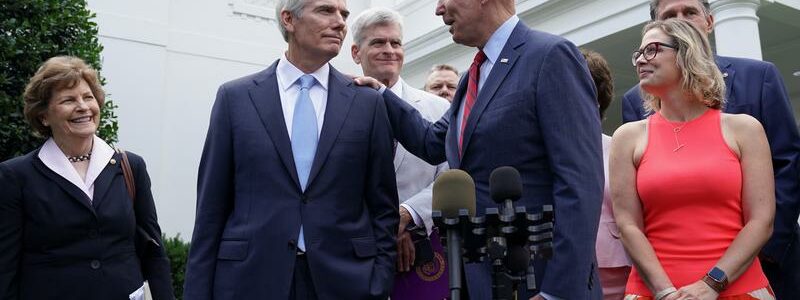
McConnell undecided on infrastructure plan as senators head to White House
WASHINGTON (Reuters) -The top Republican in the U.S. Senate held off from supporting a bipartisan infrastructure proposal on Thursday, as the group of senators that crafted the plan prepared to present it to President Joe Biden at the White House.
Members of the group of 21 senators, dubbed the “G-21,” reached agreement on Wednesday on the framework of a package to invest in the country’s bridges, roads and other physical infrastructure after a meeting with White House officials.
Republican senators briefed Senate Minority Leader Mitch McConnell on the plan at a morning meeting that included members of his leadership team, before heading to the White House to see the Democratic president.
“He remains open-minded and he’s listening,” Senator Rob Portman, a leading Republican member of the G-21, told reporters after meeting with McConnell. “He hasn’t made his decision.”
McConnell did not respond later to questions from reporters about his position.
“They’ve done a lot of good work. There’s a good framework there,” said Senator John Thune, the chamber’s No. 2 Republican, who also met with McConnell. He told reporters that party leaders would wait for the White House’s response and discuss the framework with members of the caucus.
Democrats, who hold narrow control of both chambers of Congress, aim to pass a bipartisan bill but also push through another large-scale spending package over Republican opposition using a Senate maneuver called reconciliation here.
The G-21 talks have focused on a $1.2 trillion, eight-year spending plan, with a mix of new and repurposed funding. It includes $559 billion in new spending.
Portman said the senators would work to sell the plan to other lawmakers in both political parties.
Related Coverage
The two sides were due to meet at the White House at 11:45 a.m. EDT (1545 GMT), the White House said in a statement.
For Biden, securing a large-scale infrastructure package is a top domestic priority.
Democratic Senate Majority Leader Chuck Schumer said on Thursday he was “encouraged” by what he had heard of the proposal, though he cautioned that neither he nor House of Representatives Speaker Nancy Pelosi, a Democrat, had seen it.
Schumer also said a $1.2 trillion bill focused on physical infrastructure would not get the Democratic votes needed to pass it without an accompanying package tackling social issues including home healthcare.
“All parties understand, we won’t get enough votes to pass either, unless we have enough votes to pass both,” Schumer said on the Senate floor. He said the Senate would aim for a vote on the bipartisan plan next month.
Pelosi told reporters the House would not take action until the Senate passes both the bipartisan infrastructure bill and another “reconciliation” bill expected to include Democratic infrastructure priorities that the other bill leaves out.
STICKING POINT
The White House opened talks with the group after Biden broke off negotiations with Republican Senator Shelley Capito. The White House said her proposals had fallen short of meeting “the essential needs of our country”.
Biden, seeking to fuel economic growth and address income inequality after the coronavirus pandemic, initially proposed spending about $2.3 trillion. Republicans chafed at his definition of infrastructure, which included fighting climate change and providing care for children and the elderly.
The White House later trimmed the offer to about $1.7 trillion in an unsuccessful bid to win the Republican support needed for any plan to get the 60 votes required to advance most legislation in the evenly split 100-seat Senate.
“We came to an agreement on a plan … and we’re just going to try to wrap it up tomorrow,” Democratic Senator Joe Manchin told reporters on Wednesday of the new plan.
A major sticking point had been how to pay for the investments. Biden has pledged not to increase taxes on Americans earning less than $400,000 a year, while Republicans are determined to protect a 2017 cut in corporate taxes.
Manchin said the framework encompassed a “long list” of mechanisms to pay for the spending, but he offered no specifics.
Thune said there were questions about whether watchdogs, including the Congressional Budget Office, would recognize some of the funding mechanisms as achieving savings.
Congressional Democrats are operating on two tracks.
While they welcomed a bipartisan deal that could win enough Republican support to pass the Senate, they are also planning to bring up a separate measure with significant additional spending on unconventional infrastructure programs, such as home healthcare for the elderly.
That measure would be brought up under special Senate rules for budget bills that would allow it to pass without any Republican support. In that case, Vice President Kamala Harris would be called upon to cast the tie-breaking vote.
Source: Read Full Article